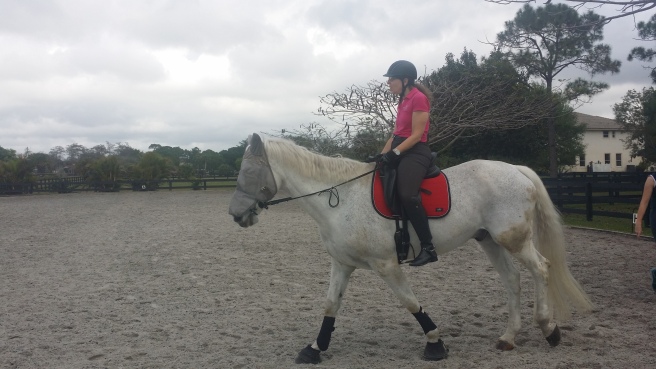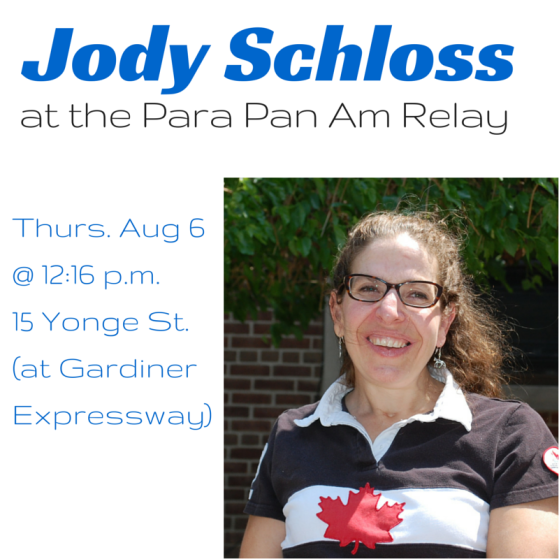Paralympian Jody Schloss seems like the type who always has a lot going on.
Her sport, para-equastrian dressage, is not included the Toronto Pan Am Games this summer, but that’s not stopping Schloss from having a big presence at the Games. For one, she’ll be carrying the torch for the Para Pan Am Relay on August 6 (details below.) After that she’s appearing in U.S. theatre director Ping Chong‘s play, Push, which runs August 11 to 14th at the Yonge Centre for the Performing Arts. The play documents the history of Paralympic sport and features the stories of six athletes, including Schloss. (For more information about the play, or to get tickets, go here.)
Schloss, who was featured in BIST’s Faces of Brain Injury stories this past Brain Injury Awareness Month, was 23 and on a “trip of a lifetime” in South America when a tragic car accident claimed the life of her friend and left Schloss with a serious brain injury, robbing her of her ability to walk and leaving her with a speech disability. She was in a coma for four months, during which time there were serious doubts as to whether she would ever wake up.
Nevertheless, she did regain consciousness – slowly, eventually transferring from a hospital in California to Toronto Western.
“I was in post-traumatic amnesia. I don’t remember anything but apparently I was responding to some things,” Schloss said about her time at Toronto Western Hospital. “The doctors said the lights were on but no one was home.”

Those doctors regarded Schloss as ineligible for rehab, recommending instead a chronic care facility. But Schloss’ mother pushed for treatment and Schloss eventually went to a rehab facility in the U.S., where she remained for four years.
Schloss’ brother, Michael Schloss, accompanied his sister to her interview at BIST. Due to Jody Schloss’ speech disability, at her request, Michael Schloss, at times, helped his sister tell her story.
They wanted to send [Jody] to chronic care. And my mom said, ‘over my dead body’. She really fought to get Jody good rehabilitation. When we were in California, the doctors didn’t’ think Jody was going to live. Then they said, she’ll live but she probably won’t wake up. She kept having these fairly dire predictions. That’s why they wanted to send her to chronic care, because they figured [she’d] recovered all [she] could. But boy were they wrong. – Michael Schloss
As she got better, Jody Schloss started to yearn to return to a beloved childhood activity – horseback riding.
“It’s about the relationship with the horse,” Jody Schloss said. “Horses are very intuitive.”
Jody Schloss ran into a lot of negativity when she expressed her interest in returning to all things equestrian. She had to prove not only to herself but to a large number of doubters that she was indeed, capable not only of riding, but riding independently. She started therapeutic training at The Community Association for Riding for the Disabled (CARD) and improved at a remarkable rate to the point of undertaking competitive riding in 2009. In only three years, she was named to the Canadian Equestrian Team, riding under the maple leaf in Para-Dressage, 1A division, at the 2012 Paralympic Games in London.
“[Dressage] is a lot of mental work,” Jody Schloss said. “You have to think about what do you need in the first place. You can look like you’re not doing anything which is why whenever you see in dressage when they look like they are standing there but they are actually a lot.”

These days, Jody Schloss is training in Toronto, waiting for her new horse, Lieutenant Lobin, to arrive from Florida. Her current horse, Inspector Rebus, has been a faithful companion for many years (he’s 17) but unfortunately he is afflicted with Cushing’s Disease, a disorder of the pituitary gland. And the medication he is required to take for it isn’t permitted in international competitions, which is why Jody Schloss is switching horses, for another time..
It’s a loss for Jody Shloss, who refers to Rebus as a “super star.” When travelling to Europe horses are flown – but not many airlines are willing to transport such a large and valuable cargo. (KLM, the Dutch is one of them.) When travelling over North America, horses generally travel by trailer.
“You know? Rebus loved [travelling],” Jody Schloss said. “He was the only horse to go in the trailer and gain weight. Most horses lose weight because of not eating. But Rebus gained weight.”
“Rebus is great,” Michael Schloss said. “He just eats a lot. He’s an emotional eater.”
“On the plane, .. he’s the calmest of all the animals,” Jody Schloss said.
Jody Schloss’ first horse after her accident was a mare named Dyna, or more officially, “Tenacious Dyamite.” While in rehab in Fort Erie, P.A, Jody Schloss had said to her therapist, “I’m naming my next horse Dynamite” The therapist replied ”That’s awfully tenacious of you.” And so “Tenacious Dyamite” was named..
As she began competitive riding, the ever-busy Jody Schloss was also pursuing a Master degree in Disability Studies, multitasking by bringing her schoolwork to the stables. She explained that her studies didn’t leave a lot of time for her riding activities, so she ultimately chose to put her academic studies on hold.
““My horse tried to eat my book,” Jody Schloss said.

An interesting fact about Jody Schloss: after competing in Europe during the summer of 2011, she returned home and decided to accelerate her training and move closer to the stables. Her new domicile turned out to be a most unlikely place – a retirement home, where she was roughly half the age of most of the residents. But it all turned out splendidly. She made friends with many of the residents (many of whom acted as quasi-grandparents) and easily bridged the generation gap.
“I actually loved [the retirement home],” Jody Schloss said. “It was accessible and … I didn’t have to pay when I was in Florida for four months. I kept my room. And they kept my cats. One of the residents called herself my grandma.”
Speaking with Jody Schloss, it’s easy to imagine her fitting in just about anywhere. Her charm is contagious, she is quick to make jokes, and also shows seemingly endless patience around others when, due to her speech disability, she is asked to repeat herself, again. And the horses seem to like her, too.
“The thing that I love [about riding] is my relationship with my horses,” Schloss said. “They are like my best friends. Every horse is wanting to protect me.”
PHOTOS COURTESY OF JODY SCHLOSS
Filed under: Para Pan Am Games Tagged: #paratough, Faces of Brain Injury, Jody Schloss, Para athletes with brain injury, Para Pam Am Games, Para Pam Am Torch Relay, para-dressage, Ping Chong, Push, Toronto 2015
![]()
Source: BIST Blog





